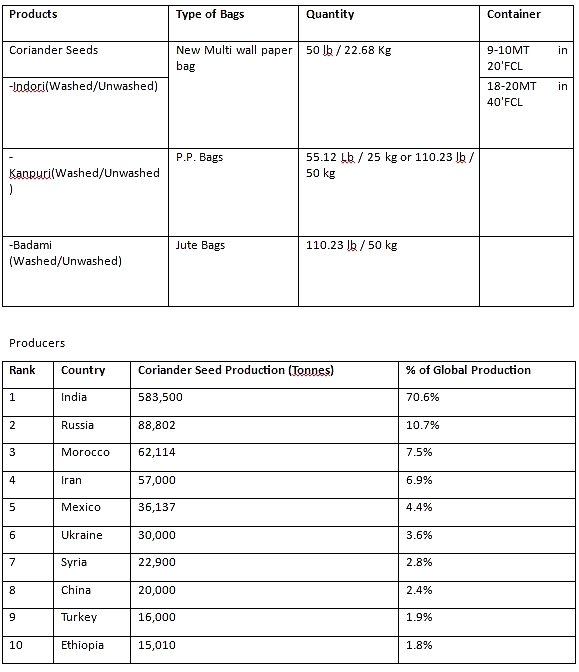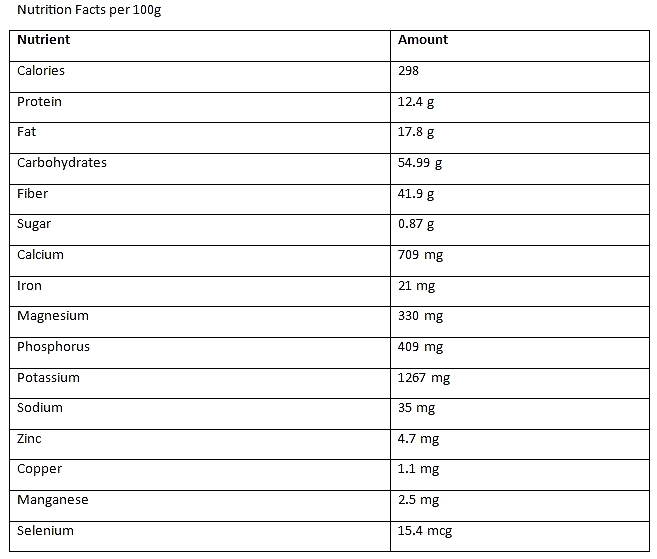- Key Features & Attributes
- Ratings & Reviews
- Know your Supplier
- Product description from supplier
Coriander Seeds, scientifically known as Coriandrum sativum, are small, round seeds obtained from the coriander plant, a member of the Apiaceae family. With a rich history that spans thousands of years, these seeds have been utilized in various cultures for their unique flavor and health benefits. Native to the Mediterranean region and southwestern Asia, coriander seeds are now cultivated globally, particularly in India, Morocco, and Egypt. They are prized for their antioxidants, vitamins, and beneficial compounds that enhance digestion, lower cholesterol, and regulate blood sugar levels. The seeds are also utilized in culinary applications to add flavor to dishes, while their antimicrobial properties contribute to food safety. When choosing coriander seeds, always opt for whole seeds for superior quality and flavor retention. To ensure longevity and maximum freshness, store the seeds in a cool, dark, airtight container, which can preserve their unique, slightly peppery flavor for months. Whether you're a culinary enthusiast or exploring natural health remedies, coriander seeds are an exceptional addition to your kitchen and wellness routine.
Key Features
| Features | Description |
|---|---|
| Culinary Use | Add flavor to a variety of dishes, including curries, soups, and salads. |
| Health Benefits | Supports digestive health, heart health, and blood sugar regulation. |
| Antimicrobial Properties | Helps combat harmful bacteria and viruses. |
| Versatility | Can be used whole, ground, or as a supplement. |
| Storage | Best stored in airtight containers to maintain freshness. |
| Attributes | Description |
|---|---|
| Scientific Name | Coriandrum sativum |
| Common Names | Coriander, Cilantro |
| Origin | Mediterranean Region and Southwestern Asia |
| Color | Light brown (Indian), Yellowish-brown (Moroccan), Dark brown (Russian) |
| Health Benefits | Digestive health, anti-inflammatory, heart health, antimicrobial properties, blood sugar control. |
| Shelf Life | Several months when stored properly in a cool, dark place. |
| Uses | Culinary spice, health supplements, Ayurvedic medicine. |
*Disclaimer: The above description has been AI-generated and has not been audited or verified for accuracy. It is recommended to verify product details independently before making any purchasing decisions.
Brand: Satyaa
Country Of Origin: India
There are several types of coriander seeds, including Indian, Moroccan, and Russian coriander. Indian coriander seeds are small, round, and have a light brown color. Moroccan coriander seeds are larger, oval-shaped, and have a yellowish-brown color. Russian coriander seeds are the largest, with a round shape and a dark brown color. Coriander seeds are typically harvested in the late summer or early fall, when the plant has matured and the seeds have turned brown.
Coriander seeds have many health benefits. They are a good source of fiber, antioxidants, and vitamins and minerals, such as vitamin C, magnesium, and potassium. Coriander seeds may help lower cholesterol, regulate blood sugar, and aid digestion. They also have antimicrobial properties and may help protect against foodborne illnesses. Coriander seeds can be used in cooking or taken as a supplement in capsule form.
Storage
Coriander seeds and oil can be found in markets year-round and are commonly used as a spice. To ensure good quality, coriander seeds should release a pleasant, slightly peppery flavor when squeezed between the index and thumb fingers. When purchasing, it is recommended to buy whole seeds instead of coriander powder, as the latter may contain adulterated spices.
When storing at home, it is important to keep the seeds in a cool, dry, and dark place in airtight containers. This will allow them to remain fresh for many months and can be ground using a hand mill when needed. If using ground or powdered coriander, it should be stored in an airtight container in the refrigerator. It is best to use the spice powder as early as possible since it can lose its flavor quickly due to the evaporation of essential oils.
Common Packing For Container Shipment


Facts and Health Benefits
1. Digestive health: Coriander seeds contain compounds that stimulate digestive enzymes, which can help improve digestion and relieve symptoms such as bloating and gas.
2. Anti-inflammatory properties: Coriander seeds contain anti-inflammatory compounds that may help reduce inflammation in the body, which can benefit conditions such as arthritis and other inflammatory disorders.
3. Heart health: Coriander seeds may help lower cholesterol levels and blood pressure, which can reduce the risk of heart disease.
4. Antimicrobial properties: Coriander seeds contain compounds that have antimicrobial properties, which can help fight against harmful bacteria and viruses.
5. Blood sugar control: Coriander seeds may help regulate blood sugar levels, which can be beneficial for people with diabetes.
6. Rich in antioxidants: Coriander seeds contain several antioxidants that can help protect against cellular damage and reduce the risk of chronic diseases.
7. Skin health: Coriander seeds may help improve skin health by reducing inflammation and protecting against oxidative damage.



